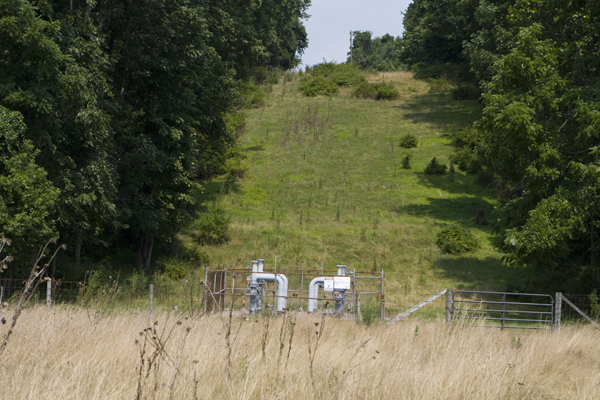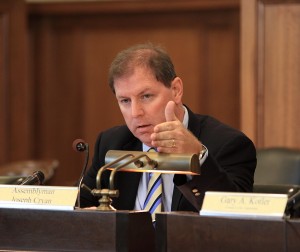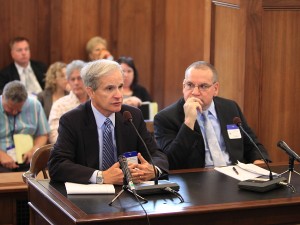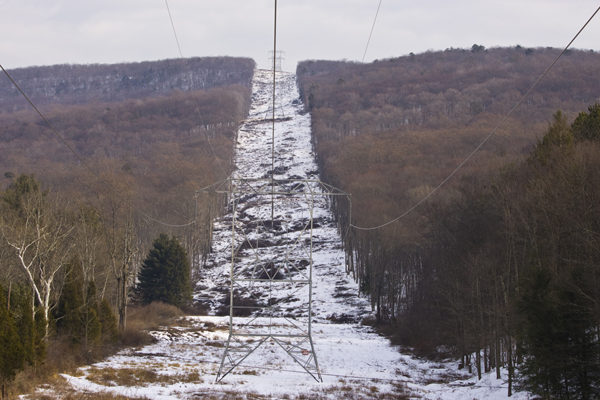Christie DEP Cuts Sweetheart Deal With Gas Industry
No Money for Parks and Public Lands – While DEP Gives Away the Store to Gas Pipeline

Gas pipeline easement across public lands (D&R Canal State Park)
[Update 3 – 7/20/10: killer Star Ledger editorial: New Jersey taxpayers get shorted on gas pipeline]
[Update 2 – 7/6/10 NJ Spotlight coverage: State Spurns Proposed Gas Pipeline Lease, Citing Lowball Offer
[Update 1 below]
Yesterday’s Star Ledger reported:
The State House Commission stalled action today on a controversial gas line proposed for construction through state-owned forests and parks in northern New Jersey, as questions rose about the $45,000 Tennessee Gas Pipeline Co. will pay the state in a 24-year lease deal.
This reminded me that back in February, I wrote (again!) about serious financial mismanagement in the DEP Office fo Leases and Concessions.
I’ve been focused on DEP’s chronic failure to update state land leases and easements to reflect current market value, noting how outrageous these corporate subsidies are during a period of fiscal crisis and massive cuts to environmental programs (see: NJ Subsidizing Oil and Gas Pipelines That Cross State Lands)
Since then, I have harshly criticized DEP Commisssioner Bob Martin for his complete lack of environmental qualifications and government experience. However, I at least thought that the former corporate consultant understood economic leverage and had some business sense!
Well, as we discuss below, either Martin is incompetent, or he hasn’t used his business acumen to protect the economic interests of NJ taxpayers.
Similarly, I have repeatedly criticized Martin and Governor Christie for advocacy of cost benefit analysis as a policy tool. Yet, in the case of DEP leases, the public interest would benefit from the cost-benefit analysis policy of Christie’s Executive Order #2.
So what is the Tennesssee Gas Pipeline Project and just what went down in Trenton yesterday? Read on, as we lay it out.

Capitol, Trenton NJ
Under cover of a Friday 9 am hearing before the 4th of July holiday weekend and during an emergency legislative session called by Governor Christie, the State House Commission was poised to rubber stamp a dirty deal with corporate giant, Tennessee Gas Co.
The State House Commission is a little known or scrutinized entity that operates below the radar and often gives away public lands for development deals. It is difficult – if not impossible – for a citizen to be aware of their meetings, agenda items, or the details of proposed projects under consideration.
But yesterday, those barriers were overcome as I joined a group of activists whose testimony disclosed the terms of the deal, temporarily derailing the stealth effort.
The proposed Tennessee pipeline would cut through NJ’s most environmentally sensitive publicly owned lands – forested water supply watersheds and parks in the Highlands. According to Sierra Club:
This pipeline proposal will cut a 23-mile trench from one side of the Highlands to the other through dozens of state parks and one of the region’s most environmentally-sensitive areas, including the watersheds of North Jersey’s largest water supply reservoirs.
The Pequanock, Monksville and Wanaque reservoirs are where 2 ½ million people get their drinking water. This is only the first half of the project. It was stopped at Monksville because the company needs permission to go through a reservoir. The project will continue to cut through more public lands and environmentally-sensitive areas.
But the financial terms are even worse than the environmental destruction.
At a time of fiscal emergency, where the state should be turning over every rock to genenate revenues, the proposed DEP 24 year lease would compensate state taxpayers with only $45,000!
That amounts to just $1,875 per year. On a per acre basis (29 acres directly destroyed, with thousands more acres of adjacent forested lands adverely impacted), that comes to just $64.65 per acre per year!! (sounds like a better deal than BP Oil got for leases in the Gulf! – Updated)
Cynically, the 24 year term – for a pipeline with a 50+ year expected lifetime – was designed to avoid legally mandated public hearings for 25 year leases.

Assemblyman Joe Cryan (D-Union) criticizes pipeline lease
Assemblyman Cryan called the deal a “gift”, said it “shocked the conscience“, and that state taxpayers were “getting screwed”.
The Star Ledger story continued:
Calling it a rip-off, Assembly Majority Leader Joseph Cryan (D-Union), who sits on the commission, described the $45,000 lease as a “gift” to Tennessee Gas as it tries to complete a $2 billion pipeline that will extend 105 miles through Pennsylvania and 23 through New Jersey, crossing over several state-owned preserves and parks. His opposition prompted the commission, which must approve any lease arrangements on public lands, to postpone action for another 10 days.
The New Jersey Highlands Coalition, the state chapter of the Sierra Club and the Public Employees for Environmental Responsibility chided the deal at a Trenton meeting, contending the project will destroy sensitive and protected lands.
“The state is about to take a mere $45,000 for a 24-year lease agreement…and no one seems to be able to explain, defend or expose the methodology that was used to come up with that number,” said Bill Wolfe of PEER.
The State House Commission will soon reconsider this project. We will keep you posted as events develop.
I’ve filed OPRA requests for the background documents and will soon be posting them and the draft mitigation list.
In the interim, contact the Governor and your legislators and let them know how you feel. The Highlands Coalition, NJ Conservation Foundation, and Sierra Club have details.
[Update: I want to make additional points to illustrate abuse of the public interest:
1. Environmentalists complained that there was no public participation in the project’s review. The project’s lobbyist testified to rebut that by claiming the project had undergone public review before the Highlands Council. But that was highly misleading, because the Highlands Council granted the project an exemption and the basic terms and documents supporting the deal, such as the lease, the land appraisal, and the mitigation plan are still not available for public review.
2. Environmentalists criticized a) significant adverse impacts impacts, some that were irreversible and/or could not be mitigated; b) the failure to consider alternative pipeline routes and competing projects by other pipeline companies; c) lack of detailed mitigation requirements; and d) linkage to the controversial Marcellus shale gas drilling project, significant portions of which are currently under a moratorium by the Delaware River Basin Commission.
Tennessee Gas and DEP’s testimony in response to these criticisms was highly misleading:

In response to criticism, Tennessee Gas testifies to defend pipeline project
a) Tennessee’s lobbyist testified that the project met the strict environmental requirements of the Highlands Plan. But that was simply flat out false because the project was found inconsistent with the Plan but not required to comply because it was granted a utility exemption;
b) there was no testimony to rebut this criticism because NJ lacks any planning or regulatory process to consider energy infrastructure planning, siting, impact, or alternatives analysis. Those fatal defects are not satisified by the Fedral Energy Regulatory Commission certification of need process;
c) a draft punch list of mitigation requirements was provided by DEP to one environmentalist on the day before the hearing. This extremely limited review of a simple list of items, without any supporting documentation – is a far cry from public review of the merits of a detailed mitigation plan.
d) Tennessee’s lobbyist testified that the project was not necessarily linked to the Marcellus shale project, and that the pipeline’s capacity was spoken for by existing contracts for gas from non-Marcellus sources. This testimony contradicted the company’s own press release, as reported here
Last, and most absurd, is the after the fact DEP defense of the land appraisal that allegedly supports the $45,000 lease value. During the hearing, DEP could not explain, defend, or produce the appraisal. I testified that ther appraisal must be based on the economic value of the allowable use of the land (i.e for a gas pipeline). Star Ledger reporter Brian Murray asked DEP about this, to which, DEP claimed that:
the $45,000 lease price resulted from an independent appraisal that placed a low value on the land because most of it is in the Highlands preservation area, where development is restricted
That is obviously absurd – DEP and Tennessee can’t have it both ways: low land value because of development restrictions for purposes of appraisal, yet an intensive and highly profitable allowable use of that same land!!

how much is a utility easement worth?
then too, how much do we lose without the public utilities. I do think the state should re-think their monetary compensation not because of the states hardships, but in respect of the land they are using. Wonder if the tables were turned, how much would they compensate to the state if they had full control of the lands value.
Hi Jack – Tennesseee Gas Co. is NOT a public utility.
And there was no demonstration of need (i.e. demand) or environmental benefits of this project, so it is impossible to support your claim that we would lose something without the public utilities.
I doubt Tennessee Gas would compensate teh state for one dime if they owned the land that DEP is giving to them under the sweetheart lease deal.
The fiscal crises only emphasizes the importance of collecting all that is owned to the taxpayer. This should not influence the land value, which should be based on the economic values of the allowable use for a very profitable gas pipeline.